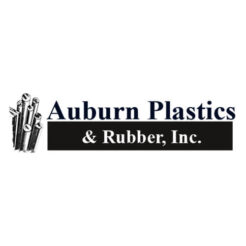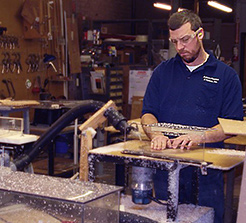Auburn Plastics

Auburn Plastics, Inc., is a former plastic parts manufacturing company in Auburn, New York. The company began as a button factory and later moved exclusively into plastic molding.
Workers at Auburn Plastics were exposed to asbestos due to its use in molded plastic products. Belluck & Fox, LLP, represents former Auburn Plastics employees who have developed asbestos diseases such as mesothelioma. To learn how we can help you and your family, contact us for a free case review.
History of Auburn Plastics and Its Factories
Table of Contents
Auburn Button Works was established by John H. Woodruff in 1876 for the purpose of making stylish, European-style buttons for American customers that cost less than imported buttons.
The button factory started out in what was once a paper bag factory at the rear of a post office on Exchange Street in Auburn. The company’s early buttons were made from a gypsum-based mixture that was poured into molds and subjected to high pressure followed by a cooling process. Sorters trimmed off excess material, and finishers filed the buttons smooth. The buttons were then sewn onto cards and packed for shipping. This process turned out roughly 1,000 buttons per day.
In 1879, the company needed room to expand, and so the Auburn Button Works and Logan Silk Mills factory complex was built on Logan Street. Now on the National Register of Historic Places and converted into loft living spaces, this industrial building complex had three parts: a three-story main building; a two-story west wing; and a three-story east wing.
In 1900, Auburn Button Works moved to the Stevens plant on Washington Street, and when Auburn’s product line evolved into molded plastic materials, the company bought a much larger plant on Canoga Street.
Through the 1930s and ’40s, Auburn Button Works continued to grow and expanded its product line, which by midcentury included pearl buttons, shellac buttons, 78 rpm records, typewriter keys, pipe stems, electrical goods, and gun butts. The demand for products created by World War II led the company to purchase another plant on McMaster Street.
In 1957, the company changed its name from Auburn Button Works to Auburn Plastics because it hadn’t made buttons in more than a decade. Auburn Plastics made plastic parts for cameras, cooking utensils, luggage, musical instruments, and surgical tools, as well as parts for manufacturers in the chemical, aviation, optical, and other industries, until the 1990s. The company was dissolved in 1993.
Asbestos Exposure and Auburn Plastics Products
In the early days of plastics, the material was thought of almost as a miracle product. It was durable, easily tinted to any color, and could be molded into virtually any shape. However, the use of asbestos in plastic compounds was also common in the early days, putting those who worked in plastic-producing factories and plants in danger of being exposed to the potentially deadly fiber.
As an ambitious producer of plastic parts, Auburn Button Works and Auburn Plastics incorporated asbestos into a variety of its products, from molded insulation in electrical devices to handles for cooking utensils. Workers at Auburn Button Works and Auburn Plastics factories may have been exposed to asbestos when transporting the material for use in plastic molding compounds, mixing the raw fibers into molding compounds, cutting the molded plastic, or just working in the same area where the asbestos was being used.
Belluck & Fox, LLP Represents Workers Who Were Exposed to Asbestos
Although Auburn Plastics closed up shop in 1993, the effects of asbestos exposure among the company’s former workers are still evident today. For those workers who are now facing serious health problems such as mesothelioma, asbestos lung cancer and asbestosis diagnosis the experienced New York mesothelioma lawyer sat Belluck & Fox, LLP are here to help.
We have extensive knowledge of the asbestos products and asbestos companies that put workers at risk, and we have spent years assisting those who have been harmed by asbestos exposure. Visit our office in the City of New York.
Contact us today to schedule a free case review with an experienced asbestos attorney.
Sources:
